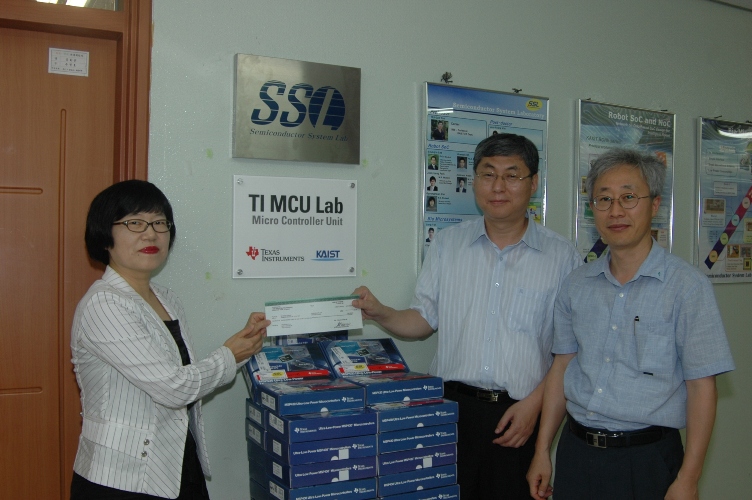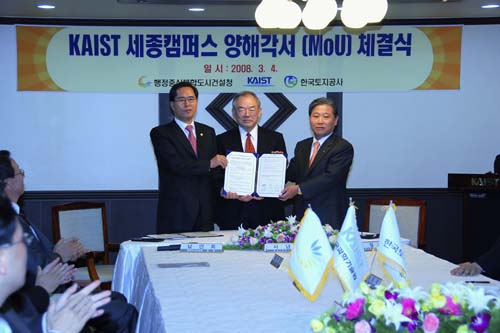signed
-
 Kazakhstan to develop E-Government, Green Economy innovative programs
Source: Trend, Feb. 25, 2011
The Kazakh Economic University (KazEU) and the Korea Advanced Institute of Science and Technology (KAIST) have signed a memo on joint work in the field of development of "E-Government" and "Green Economy" innovative programs. For more news, please go to the link, http://en.trend.az/capital/business/1836138.html.
2011.03.01 View 8874
Kazakhstan to develop E-Government, Green Economy innovative programs
Source: Trend, Feb. 25, 2011
The Kazakh Economic University (KazEU) and the Korea Advanced Institute of Science and Technology (KAIST) have signed a memo on joint work in the field of development of "E-Government" and "Green Economy" innovative programs. For more news, please go to the link, http://en.trend.az/capital/business/1836138.html.
2011.03.01 View 8874 -
 Texas Instruments, Inc. Agreed for Collaborative Research with Professor Hai-Joon Yoo, the Electrical Engineering Department of KAIST
Professor Hai-Joon Yoo from the Electrical Engineering Department of KAIST made a research collaboration agreement with Texas Instruments (TI), Inc. in July 2010 to develop a “Many-core Processor Chip,” a chip that is designed to emulate a human brain.
TI, Inc. is an American company based in Dallas, Texas and renowned for developing and commercializing semiconductor and computer technology. The company is the 4th largest manufacturer of semiconductors worldwide, 2nd supplier of chips for cellular handsets, and 1st producer of digital signal processors and analog semiconductors, among a wide range of semiconductor products.
TI, Inc. has designated Professor Yoo’s lab as one of its official labs and promised to give financial supports for the lab—it has pledged to donate a total value of 300 million won of research fund and equipment to Professor Yoo. On July 21, 2010, the signboard hanging ceremony for the designation of a TI Lab was held at Professor Yoo’s lab.
Professor Yoo developed a neuro-circuit network to emulate a human brain by adopting a mixed mode circuit that has chips for analog and digital circuits. He then has conducted a research to graft the mixed mode circuit onto a Many-core Processor to integrate the human intelligence into a conventional single-core processor that can process one instruction at a time. The Many-core Processor, once developed, can be applied to various kinds of products such as an artificial intelligence surveillance camera, robot, smart car, and the like.
Professor Yoo has presented his research results at numerous international meetings and conferences, among other things, the International Solid-State Circuits Conference (ISSCC), a global forum sponsored by the Institute of Electrical and Electronics Engineers (IEEE) for presentation of advances in solid-state circuits and Systems-on-a-Chip. The Conference offers a unique opportunity for engineers working at the cutting edge of IC design to maintain technical currency, and to network with leading experts.
Professor Yoo is a senior member of IEEE and Chairman of ISSCC in Asia.
2010.08.05 View 13495
Texas Instruments, Inc. Agreed for Collaborative Research with Professor Hai-Joon Yoo, the Electrical Engineering Department of KAIST
Professor Hai-Joon Yoo from the Electrical Engineering Department of KAIST made a research collaboration agreement with Texas Instruments (TI), Inc. in July 2010 to develop a “Many-core Processor Chip,” a chip that is designed to emulate a human brain.
TI, Inc. is an American company based in Dallas, Texas and renowned for developing and commercializing semiconductor and computer technology. The company is the 4th largest manufacturer of semiconductors worldwide, 2nd supplier of chips for cellular handsets, and 1st producer of digital signal processors and analog semiconductors, among a wide range of semiconductor products.
TI, Inc. has designated Professor Yoo’s lab as one of its official labs and promised to give financial supports for the lab—it has pledged to donate a total value of 300 million won of research fund and equipment to Professor Yoo. On July 21, 2010, the signboard hanging ceremony for the designation of a TI Lab was held at Professor Yoo’s lab.
Professor Yoo developed a neuro-circuit network to emulate a human brain by adopting a mixed mode circuit that has chips for analog and digital circuits. He then has conducted a research to graft the mixed mode circuit onto a Many-core Processor to integrate the human intelligence into a conventional single-core processor that can process one instruction at a time. The Many-core Processor, once developed, can be applied to various kinds of products such as an artificial intelligence surveillance camera, robot, smart car, and the like.
Professor Yoo has presented his research results at numerous international meetings and conferences, among other things, the International Solid-State Circuits Conference (ISSCC), a global forum sponsored by the Institute of Electrical and Electronics Engineers (IEEE) for presentation of advances in solid-state circuits and Systems-on-a-Chip. The Conference offers a unique opportunity for engineers working at the cutting edge of IC design to maintain technical currency, and to network with leading experts.
Professor Yoo is a senior member of IEEE and Chairman of ISSCC in Asia.
2010.08.05 View 13495 -
 KAIST to Build Branch Campus in New Administrative City
KAIST signed a memorandum of understanding (MOU) with the Multifunctional Administrative City Construction Agency and the Korea Land Corporation on March 4 to build a branch campus in the city now under construction to house many government organizations to be relocated from Seoul.
The MOU calls for building a well-facilitated KAIST campus on 310,000 square meters of land within the planned city, about 30 kilometers west of Daejeon. The multifunctional city, named Sejong City, is scheduled to be dedicated in 2014.
The MAC now being built in the Yongi-Gongju area of South Chungcheong Province is geographically in the center of South Korea, and many governmental agencies and major public organizations will move in from 2015.
The KAIST campus is envisioned to be home to a newly established College of Strategy and Policy, a Strategy and Policy Research Center, and an Innovative Technology Research Center. The College of Medical Science currently based in the Daejeon campus will be relocated to the campus. With a research-oriented hospital and a medical engineering research center, KAIST hopes to become a leading institution in disease treatment and medical engineering technologies.
The new campus is also expected to house new KAIST colleges now in the planning stage which will offer interdisciplinary courses such as the College of IT and Contents and the College of Life Sciences. KAIST also seeks to resolve housing shortage problems by building an in-campus village designed to provide international living environment for professors and students on the planned campus
2008.03.18 View 15984
KAIST to Build Branch Campus in New Administrative City
KAIST signed a memorandum of understanding (MOU) with the Multifunctional Administrative City Construction Agency and the Korea Land Corporation on March 4 to build a branch campus in the city now under construction to house many government organizations to be relocated from Seoul.
The MOU calls for building a well-facilitated KAIST campus on 310,000 square meters of land within the planned city, about 30 kilometers west of Daejeon. The multifunctional city, named Sejong City, is scheduled to be dedicated in 2014.
The MAC now being built in the Yongi-Gongju area of South Chungcheong Province is geographically in the center of South Korea, and many governmental agencies and major public organizations will move in from 2015.
The KAIST campus is envisioned to be home to a newly established College of Strategy and Policy, a Strategy and Policy Research Center, and an Innovative Technology Research Center. The College of Medical Science currently based in the Daejeon campus will be relocated to the campus. With a research-oriented hospital and a medical engineering research center, KAIST hopes to become a leading institution in disease treatment and medical engineering technologies.
The new campus is also expected to house new KAIST colleges now in the planning stage which will offer interdisciplinary courses such as the College of IT and Contents and the College of Life Sciences. KAIST also seeks to resolve housing shortage problems by building an in-campus village designed to provide international living environment for professors and students on the planned campus
2008.03.18 View 15984